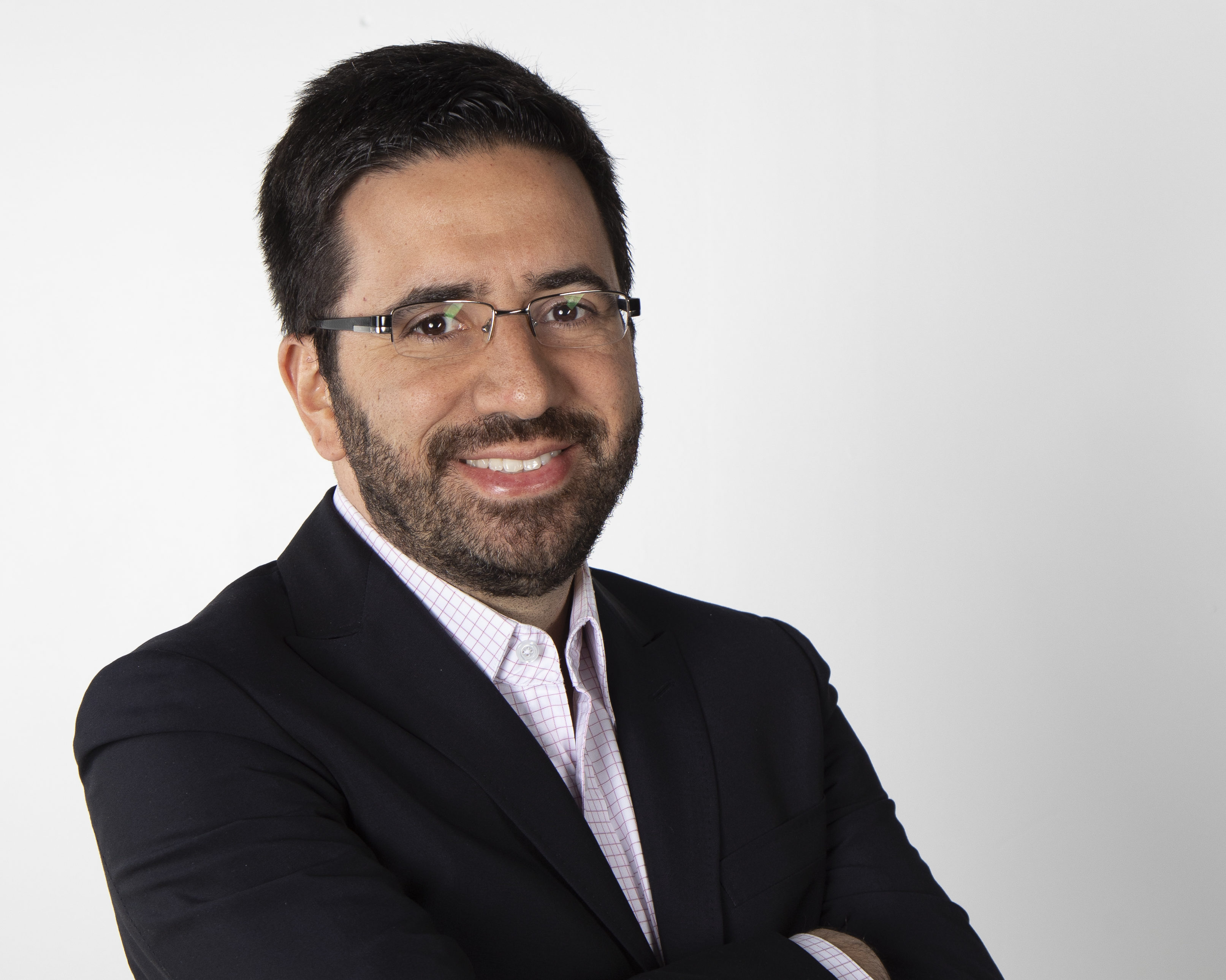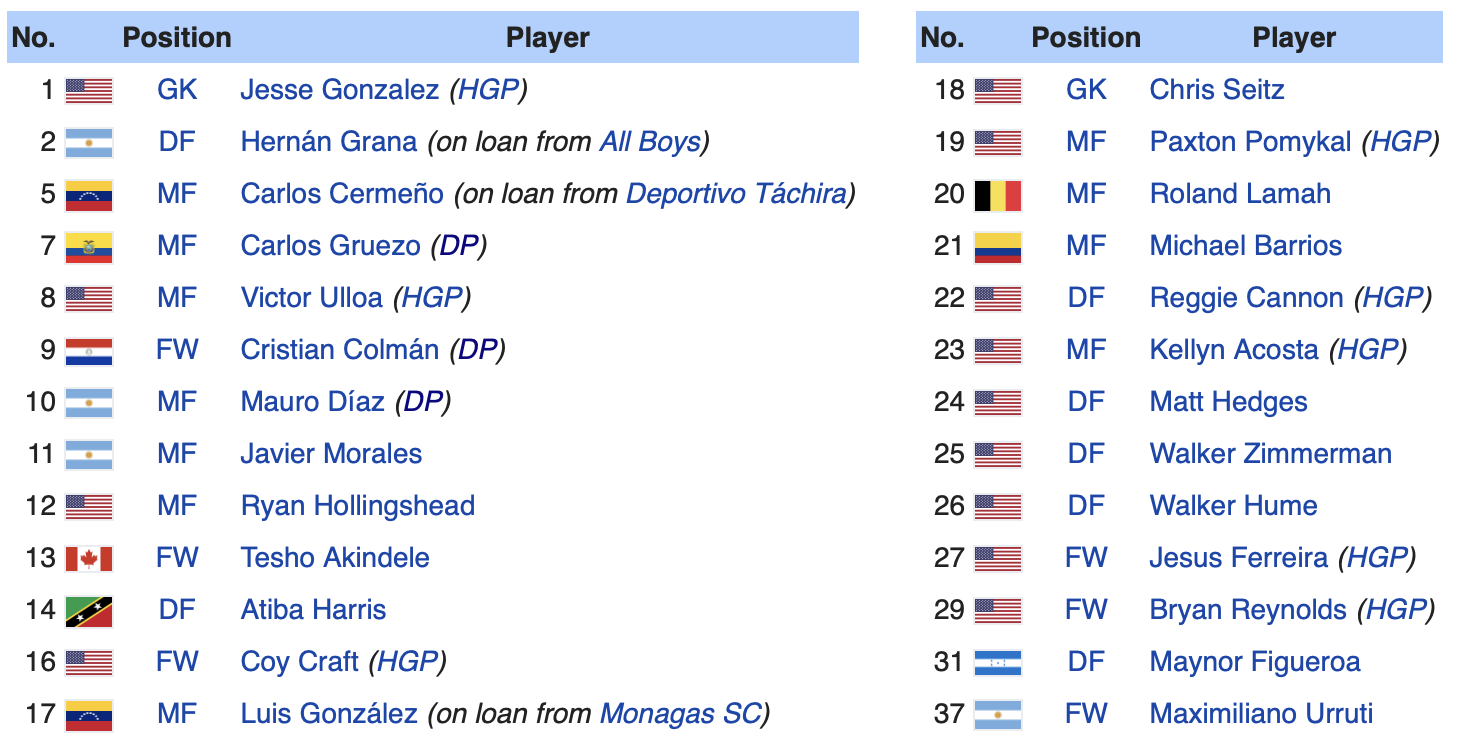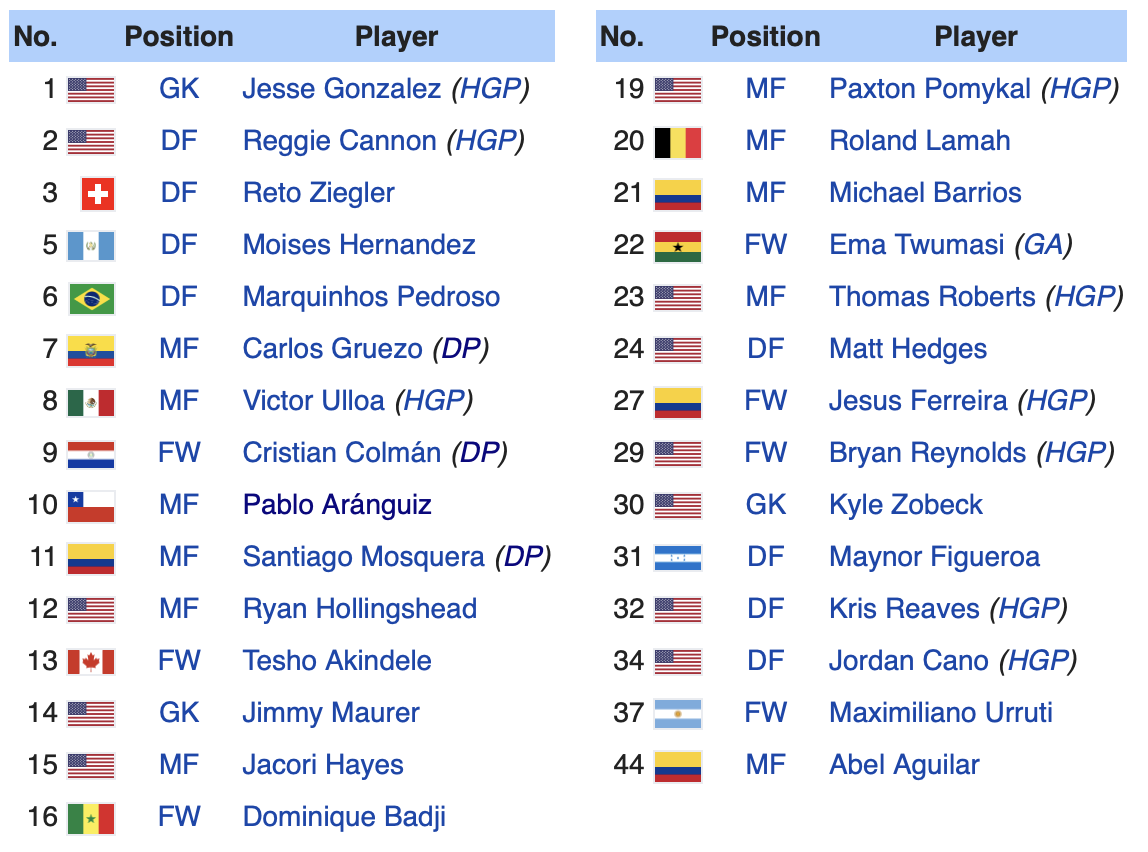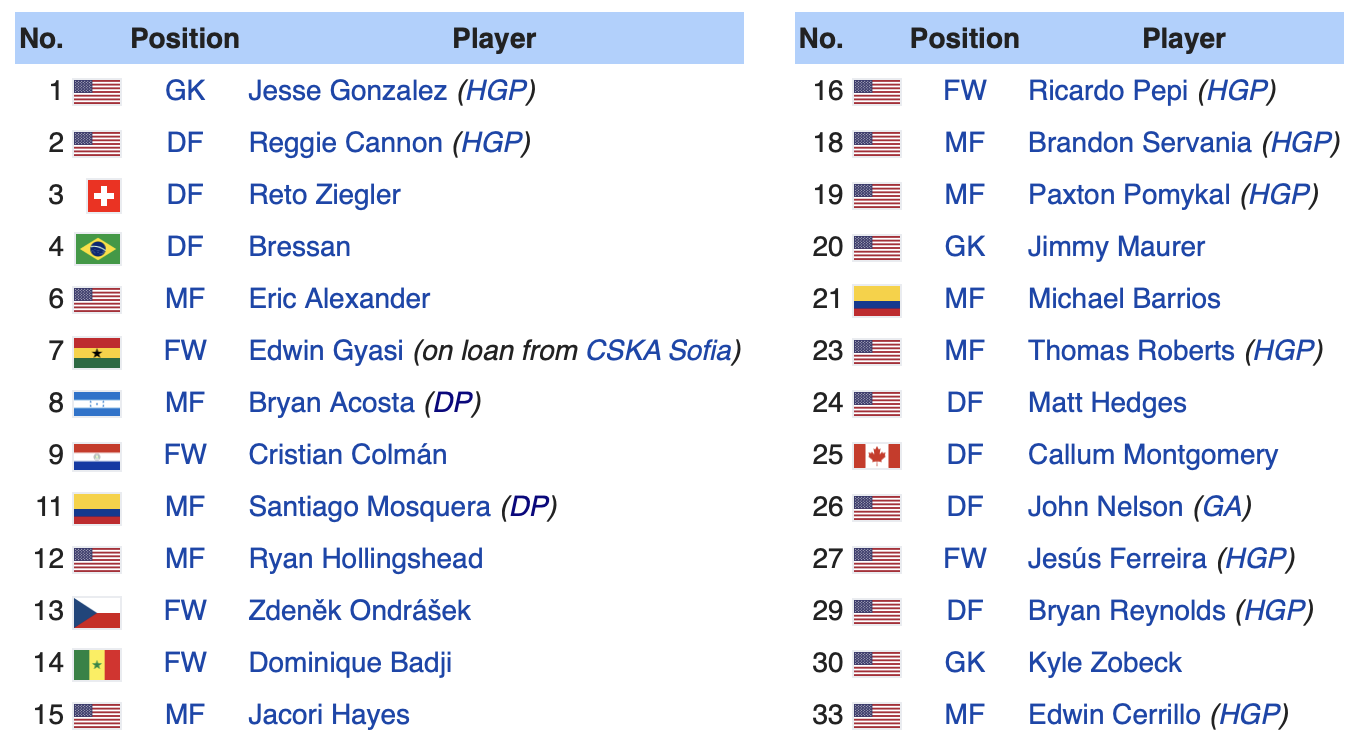It seems the general consensus is FC Dallas punched out an above-average season in 2019. The ‘B’ grades awarded from local media all fall back to grading on a generous curve; the owners chose this design after all.
In the spirit of debate spare the crutch of “youngest roster and rookie coach” and take a moment to consider the case of why 2019 was just another ‘C’ average FCD season simply sporting a younger coat of paint.
| season | points | goal diff | place | playoffs/result? |
| 2017 | 46 | 0 | 7th | out |
| 2018 | 57 | +8 | 4th | In/1st round |
| 2019 | 48 | +8 | 7th | In/1st round |
Set aside the whole age/experience claim and just consider where this club has gone since the great 2016 season. By all measures, the ’17 and ’18 seasons ended in disappointment, largely marked by season-closing nose dives. 2019 was a slight improvement in that department, where ’17 and ’18 were marred with Aug/Sept runs with losing records, ’19 went 4-4-3, a .500 record, a.k.a. average.
Along that same line, there are no significant measures that separate the Huntsmen’s 2019 from the two previous seasons. The variances in stats have some slight difference up and down, but nothing definitive. If final placement in the standings is of importance to you consider this: not only did 2019 end up three Western Conference slots lower than 2018 and the same as 2017, the next stat is for those of you who hold the single table/total points as the One True Measure:
| Supporter’s Shield | |
| 2017 | 12th |
| 2018 | 6th |
| 2019 | 13th |
Yes, 2019 is actually the worst result since 2016. Still, think 2019 deserves a ‘B’?
If you’re up for some fun, now review these rosters.
Take a gander at these from 2017, ’18 and ’19 (pulled from Wikipedia) and decide which you’d prefer, simply based on talent, value, and production. Is anyone taking Atiba Harris over Bryan Reynolds, Abel Aguilar over Edwin Cerrillo, Marquihos Pedroso instead of John Nelson or Roland Lamah over anyone that isn’t Edwin Gyasi? Opinions will differ here, but point being – it may seem obviously fair to grade the 2019 roster on the curve, but it’s almost certain it’s the roster you’d choose. And, if you agree to that, congrats, you’re the Hunts.
Based on the stats, one cannot justify a grade better than a ‘C’ without putting the club on a curve. Allowing credit for the “youngest roster” and “rookie coach” elements do little more than validate the Hunts’ decision to pursue this model. While it may have been the most logical, it should not also provide a bonus cover for how this club got here in the first place.
Think of it this way: What would have made 2019 a failed or even average season? Extending this logic, one could argue missing the playoffs or ending up at the bottom of the table would be expected for a club weighted down by such burdens. If Dallas had lost to KC in that final game what grade would you have given, then? Would missing the playoffs after rolling through September scoring a single goal justified a “C”? Is it not generous to award a ‘B’ to a side that only won six games in the second half of the season, with only two of those against teams with winning records? That gets you a B?
Here’s the main argument against grading on a curve: All of this is a construction of choices by Clark and Dan. They did not have to run with the youngest roster or hire a coach with zero professional experience. It may be admirable, but it wasn’t accidental. How the season turned out was not the result of unlucky occurrences that generally lead to grading on a curve. The team didn’t suffer a Mauro Diaz season-ending injury, nor did its star player suffer food poisoning on the eve of the big playoff game.
If you want to applaud the Hunts for rolling with the kids and believing in Luchi, fine – as it’s easy to buy into that romantic idea, but does that also then absolve them from seasons that end somewhere around the beginning of the playoffs? Supposing it does, then the next question is – when does that stop? Perhaps 2020 results in something similar, even maybe slightly better, can you really hold players and staff who will have matured by a mere single year, any more accountable?
FC Dallas is not an expansion club, it is a founding member. If you’re in the camp that FCD and the Dallas Burn are two wholly different things, fair enough; since the Hunts took over this club there have been 17 MLS Cups. Fourteen of the 34 participants and eight of the winners are clubs that joined the league after Lamar saved the Burn from extinction. To drive home this point – every team in MLS Cup since 2016 joined the league post-FCD rebrand.
Patting the Hunts on the back (aka, giving them a B) for 2019 simply empowers them to stay the course. As the rest of MLS’ top clubs push the limits on spending and signing truly impactful game changers – the Hunts are asking fans to splash money on an idea they can do this differently while simultaneously frugally spending theirs.

You may suggest waiting to see what reinforcements come for 2020, but there is zero historical evidence they are willing/able to deliver the support of a Brian Fernandez, RuiDiaz, Pozuelo, or Vela. Sure, Andre Zanotta just got here and deserves a mulligan on Edwin Gyasi, but again, the Hunts didn’t have to hire a guy with no MLS experience and who even admits is, “still figuring out the league”.
Being obstinate on grading the 2019 FCD as bang-average ‘C’ is not some sort of pessimistic agenda, it is a fair attempt to set this club on equal MLS footing even if the Hunts choose not to. Supporting the idea of making the most out of what this club does do well is reasonable, but should fans be forced to reset their expectations backward to accepting moral victories?
While some of us wonder how the club got so far from the promise of the 2016 season one can easily envision Dan Hunt, upon seeing new media grades of “B”, pushing back from his computer, kicking his feet up on the desk and warming to the self-congratulatory sense of a job well done.




“You may suggest waiting to see what reinforcements come for 2020, but there is zero historical evidence they are willing/able to deliver the support of a Brian Fernandez, RuiDiaz, Pozuelo, or Vela.”
Completely agree. Furthermore, there’s not much room to bring impactful reinforcements on the Hunt model. That model being target ~3 young unknowns with a high ceiling and hope to catch fire despite all the obstacles in front of them. The largest being adapting to the MLS play stye and travel schedule.
Context matters in my view. If FCD would have stuck with most of the players from 2018, this year would have been a disaster regardless of who was coaching. Considering 2019 as a retrenching year (which all teams go through), finishing 7th is a good result. FCD’s future is brighter than most other MLS clubs and FCD didn’t have to win the wooden spoon to get there.
Though the Hunts deserve lots of criticism for not using roster assets properly (DP slots, xAM), for not putting enough financial resources into the first team, and for over-promising and under-delivering impact signings, they deserve some credit for building a strong academy that produces quality and quantity, for (finally) getting a USL affiliate up and running and stocking it with talent, and for resigning Pax (and trying to resign Cannon).
Also, don’t undersell the 2017 roster. For one game, I’ll take Gruezo over B. Acosta at the 6. 2017 Diaz was a far more proven facilitator than anyone on the 2019 roster. Javi Mo off the bench is strong. Ziegler over Zimmerman isn’t a given. K. Acosta is a quality MLS player even if not a world-beater. And for one game, I would take 2017 Atiba over 2019 Reynolds. Reynolds has way more upside, but he’s still raw. And if you’re looking at the potential of Reynolds over Atiba (or Pax over Mauro or Servania over K. Acosta), then I also think you have to grade 2019 FCD on some sort of curve.
Definitely appreciate the point that it was the choice of the FO to make the changes to the roster and coaching staff that lowered expectations for 2019. I just happen to think they made the right choice in hitting the reset button, fundamentally changing how the organization pursues winning. A retread of the teams under Pareja wouldn’t compete sustainably going forward. Being LAFC or Atlanta or Portland but with less money is not a compelling strategic path. 2016-18 were “win now” years where FCD couldn’t get it done, and the stakes of chasing trophies in that way have become prohibitive unless the owner is (1) a billionaire (Atlanta, New England, Portland), or (2) a large group of multi-millionaires (LAFC, Miami, Seattle).
The organization’s best asset is its capacity for player development, and FCD is making itself uniquely reliant on that core competency. The transition from Pareja’s FCD to this new version of FCD was inevitably going to impact results in the near term. I am willing to accept barely making the playoffs in 2019 as the price of a realistic vision for future success. 2020, I haven’t decided. Championship contender in 2021 or bust.
Yep